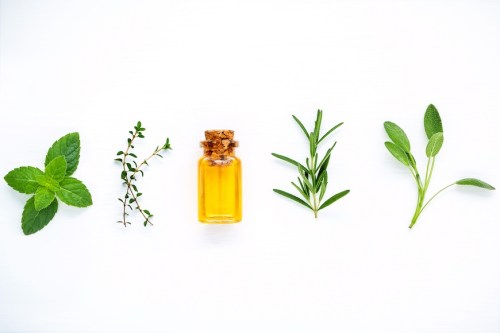There’s no getting around it: A pesky cough is annoying. Like, so annoying, especially considering that some research has found standard over-the-counter cough medicines aren’t always so effective for combatting the symptoms and treating the underlying problem. That said, there are some great options for calming a cough, and a number of them include essential oils.
There’s a variety of oils you can choose from when it comes to treating and easing the symptoms that come with a cough, says aromatherapist Amy Galper, co-founder of the New York Institute of Aromatic Studies. While each oil works a little differently, all of the selects listed below have been shown to thin mucus, kill microorganisms, support your immune system, help you cough out mucus, work as a decongestant, serve as an anti-inflammatory, kill bacteria, and improve circulation, Galper says. Basically, these are great tools to have on hand for whenever that next super-annoying cough strikes.
Keep the following seven essential oils around to help fight a cough
1. Eucalyptus
“I use eucalyptus a lot for upper-respiratory infections, including coughs,” says Irina Todorov, MD, medical co-director for the Cleveland Clinic Center for Integrative Medicine.
In fact, the essential oil offers many benefits, but it’s known for decongestant properties, says Michele Mack, a licensed massage therapist at the Center for Integrative Health and Wellness at The Ohio State University Wexner Medical Center. Its antimicrobial, antiviral, and expectorant qualities can also help combat the symptoms that come along with a cough, she adds. To use it, add a drop or two to a steam bath. “It breaks up gunk within a few hours,” she says.
2. Peppermint
Peppermint has a strong scent, but due to its menthol and menthone components, “it’s a great antispasmodic and decongestant,” Mack says. To use it, either put it in a steam bath and inhale, or apply peppermint oil to a carrier oil or lotion and rub it on your chest. (Furthermore, research shows peppermint oil offers mood-boosting effects, which can’t hurt your efforts for kicking a lingering cough.)
3. Rosemary
This herbal oil is used in a lot of tonics for chest congestion, Dr. Todorov says. It has anti-inflammatory and antibacterial properties that make it great for ditching a stubborn cough, she says. To use rosemary, apply a drop or two to a steam bath and breathe it in, or add it to a carrier oil, rub it on your chest, and inhale.
4. Lemon
Not only does lemon oil smell amazing, but the component d-limonene is a vasorelaxant (meaning it can relax your blood vessels). And that can help with a cough, Mack says.
Dr. Todorov recommends adding a few drops of lemon essential oil to almond oil and rubbing it on your chest and neck. Bonus: It serves as a nice, citrusy perfume, too.
5. Thyme
Thyme is packed with cough-fighting properties—it’s antioxidant, antibacterial, and antifungal, Dr. Todorov says. There are a few different ways to get the most out of thyme when it comes to a cough, she says: You can put a few drops in a tea and drink it, or add a few drops into a carrier oil and rub it onto your chest.
6. Tea Tree
Tea tree oil isn’t just a great treatment for your hair and laundry; Mack says it’s also a strong anti-infectious oil. “It can be great for respiratory infections thanks to its decongestive and expectorant components,” she says. To use it, you can diffuse a few drops into the air or add several drops to a carrier oil and rub it on your chest and neck.
7. Frankincense
Frankincense is “great for respiratory infections,” Mack says. And, as a side effect, it can also help relieve tension and lift your mood. To use frankincense to fight a cough, Dr. Todorov recommends putting it in a steam bath and breathing it in for 5 to 10 minutes, or using it in an aromatherapy diffuser.
What to keep in mind when using essential oils for cough treatment
In general, essential oils are easy and safe support tools to use when fighting a cough, Galper says. Still, there are a few rules of thumb to keep in mind when using them:
- 1.Dilute your oil: That can mean using a carrier oil like almond, grapeseed, avocado, or coconut oil, or using aloe vera gel, Galper says. The best ratio is 2 percent dilution (so, 10 drops of oil per one ounce of carrier), Dr. Todorov says.
- 2.Keep your concentration low for a steam bath: A drop or two is great here, Mack says. “With a steam, usually one drop is perfect.” But, if it doesn’t seem to be as effective as you hoped, give two drops a try. “Three would be way too harsh on the system,” she says.
- 3.Close your eyes during a steam bath: If you’re doing a traditional steam bath, in which you put a towel over your head and breathe in the steam deeply, you’ll want to close your eyes to avoid irritation by the oil, Dr. Todorov says.
- 4.Talk to your doctor if you’re pregnant or breastfeeding: It’s a good idea to make sure there are no potential side effects of using an essential oil during this time, Dr. Todorov says.
- 5.Check in with your doctor before using essential oils on children: Some oils may not be safe for all small kiddos to use, Mack says. Talking to your child’s doctor before using any specific oil on them is always a safe bet.
- 6.Be wary of certain oils if you have a lung condition: Galper suggests avoiding eucalyptus, peppermint, and oregano if you have a lung condition like asthma or chronic obstructive pulmonary disease; however, frankincense, lemon, and tea tree oil should be fine. (Of course, talk to your doctor if you’re not sure.)
- 7.Don’t go in the sun when using essential oils: Citrus oils in particular, like lemon, can cause blistering if you apply them to your chest and skin and then go into the sun, Dr. Todorov says.
Think of essential oils as a supplement to your arsenal of cough remedies rather than the ultimate solution, Mack says. And, if you have a cough that persists, doesn’t seem to be improving, or even may be getting worse, it’s a good idea to see your doctor to get evaluated. It could be a sign of a larger underlying infection that needs treatment.
But if your cough seems of the basic variety, and you have additional questions or concerns about using essential oils to treat it, consult an an integrative medicine specialist or an aromatherapist for expert (and great-smelling) guidance.
Sign Up for Our Daily Newsletter
Get all the latest in wellness, trends, food, fitness, beauty, and more delivered right to your inbox.
Got it, you've been added to our email list.










